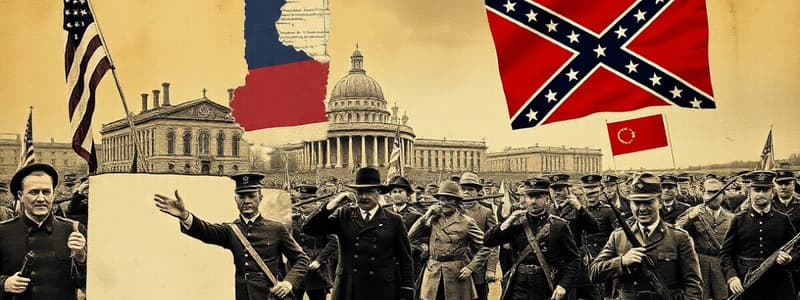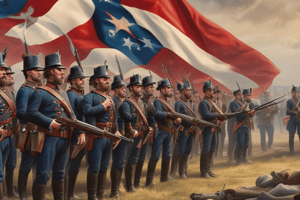Podcast
Questions and Answers
What was the main reason why Lincoln was hesitant to free slaves in the Border States?
What was the main reason why Lincoln was hesitant to free slaves in the Border States?
- He believed that slavery was a moral evil and should be abolished immediately.
- He worried that freeing slaves would lead to widespread unrest and violence.
- He felt that it was necessary to appease the Southern states and avoid further conflict.
- He feared that doing so would alienate these states and cause them to join the Confederacy. (correct)
What was the significance of the Battle of Antietam?
What was the significance of the Battle of Antietam?
- It was the first major battle of the Civil War, marking the beginning of the conflict.
- It was a turning point in the war, leading to the Emancipation Proclamation and a shift in the Union's strategy.
- It was the bloodiest battle of the war, with over 25,000 casualties, and marked a turning point in public opinion against the war. (correct)
- It was a decisive victory for the Confederacy, allowing them to gain control of the Mississippi River.
What was the key factor that led to the South's secession from the Union?
What was the key factor that led to the South's secession from the Union?
- The Southern states felt that they were being exploited by the Northern states, who controlled most of the country's wealth and power.
- The Southern states wanted to create their own nation, separate from the Union, where they could maintain their own way of life and institutions.
- The Southern states disagreed with the Union's policies, such as its opposition to slavery, high tariffs, and federal regulations.
- The Southern states feared that Lincoln, as the newly elected president, would abolish slavery, which was the foundation of their economy. (correct)
Why was the Mississippi River considered a key strategic objective during the Civil War?
Why was the Mississippi River considered a key strategic objective during the Civil War?
What were some of the ways women contributed to the Civil War effort?
What were some of the ways women contributed to the Civil War effort?
How did the Emancipation Proclamation affect the outcome of the Civil War?
How did the Emancipation Proclamation affect the outcome of the Civil War?
What were the major factors that caused the high number of casualties during the Civil War?
What were the major factors that caused the high number of casualties during the Civil War?
What is the primary reason why Confederate officers Robert E. Lee and Stonewall Jackson are considered legendary figures?
What is the primary reason why Confederate officers Robert E. Lee and Stonewall Jackson are considered legendary figures?
What was the impact of the draft on the Civil War?
What was the impact of the draft on the Civil War?
What was the significance of the Battle of Gettysburg?
What was the significance of the Battle of Gettysburg?
Which of the following was NOT a reason why the South believed they had an advantage going into the Civil War?
Which of the following was NOT a reason why the South believed they had an advantage going into the Civil War?
Which of the following best describes the Anaconda Plan?
Which of the following best describes the Anaconda Plan?
What was the primary reason for the high mortality rate at Andersonville Prison?
What was the primary reason for the high mortality rate at Andersonville Prison?
What was the main objective of Sherman's March to the Sea?
What was the main objective of Sherman's March to the Sea?
What was the motivation behind John Wilkes Booth's attempt to kidnap President Lincoln?
What was the motivation behind John Wilkes Booth's attempt to kidnap President Lincoln?
What was the significance of the Battle of Pea Ridge?
What was the significance of the Battle of Pea Ridge?
What was the South's overall strategy in the Civil War?
What was the South's overall strategy in the Civil War?
What was the significance of the Gettysburg Address?
What was the significance of the Gettysburg Address?
Flashcards
Confederate Advantages
Confederate Advantages
The strengths of the Confederacy, including military leadership, potential allies, and lifestyle.
Union Advantages
Union Advantages
The strengths of the Union, including a larger population, industrial resources, and a strong navy.
Andersonville
Andersonville
Infamous Confederate prison known for overcrowding, shortages, and high death rates.
Anaconda Plan
Anaconda Plan
Signup and view all the flashcards
March to the Sea
March to the Sea
Signup and view all the flashcards
Gettysburg Address
Gettysburg Address
Signup and view all the flashcards
Total War
Total War
Signup and view all the flashcards
Lincoln's Assassination
Lincoln's Assassination
Signup and view all the flashcards
Goals of the Union
Goals of the Union
Signup and view all the flashcards
Goals of the Confederacy
Goals of the Confederacy
Signup and view all the flashcards
Antietam
Antietam
Signup and view all the flashcards
Emancipation Proclamation
Emancipation Proclamation
Signup and view all the flashcards
Appomatox
Appomatox
Signup and view all the flashcards
Union's disadvantages
Union's disadvantages
Signup and view all the flashcards
Draft impact
Draft impact
Signup and view all the flashcards
Women in the Civil War
Women in the Civil War
Signup and view all the flashcards
Civil War soldier's diet
Civil War soldier's diet
Signup and view all the flashcards
Discrimination of African American soldiers
Discrimination of African American soldiers
Signup and view all the flashcards
Study Notes
Presidents
- Abraham Lincoln was President of the United States
- Jefferson Davis was President of the Confederacy
Confederate Advantages
- Skilled military leaders
- Potential allies (France and Great Britain)
- Southern lifestyle (hunting and riding)
- Home-field advantage
Union Advantages
- Larger population
- More industry (factories and supplies)
- Extensive railroad network
- Superior navy
Southern Problems
- Economic ruin: struggling with costs
- Loss of cotton trade
- Severe shortages due to Union blockade
Assassination of Lincoln
- John Wilkes Booth assassinated President Lincoln
- Location: Ford's Theater, Washington D.C.
Civil War Technology
- Ironclad warships: covered with protective iron plates
Andersonville Prison
- Infamous Southern prison camp
- Lack of shelter
- Severe overcrowding
- Food shortages
- Disease: 100+ men died daily (summer months)
Union War Plan (Anaconda Plan)
- Winfield Scott's plan
- Blockade the southern coast
- Capture Richmond (capital)
- Capture the Mississippi River
- March through the South
Sherman's March to the Sea
- General William T. Sherman's campaign from Atlanta to Savannah
- Objective: destroy Southern economy and morale
- Strategy: total war (military and civilian resources)
Causes of the Civil War
- Slavery was the root cause
Nicknames for Soldiers
- Union: Federals, Yankees, Yanks
- Confederates: Johnny Reb, greyback, Rebels
Border States
- Delaware, Maryland, Kentucky, and Missouri
- Slave states that remained loyal to the Union
Confederate Strategy
- Prolong the war
- Cotton diplomacy (use cotton as leverage with potential allies)
Union Goals
- Save the United States
- Abolish slavery
Confederate Goals
- Independence
- States' rights
- No tariffs
- Continue slave trade
Union Disadvantages
- Long supply lines
- Weak generals (e.g., McClellan)
- Needed to invade and control the South
Reasons for Border State Slavery
- Lincoln was wary of Border States joining the Confederacy
War Casualties
- Disease killed more than combat
- New weaponry and outdated tactics caused high casualties
Winning Side
- Union (North) won the war
- Wore blue uniforms
Confederacy's Loss
- Confederacy (South) lost the war
- Wore grey uniforms
Start of the War
- Fort Sumter: first battle of the Civil War
- South wanted Federal officers to leave; shots fired
Famous Union Officers
- William T. Sherman
- Ulysses S. Grant
- George B. McClellan
- Robert Gould Shaw
Famous Confederate Officers
- Robert E. Lee
- Stonewall Jackson
Crucial Battles
- Antietam: bloodiest single day of the war (25,000 casualties)
- Gettysburg: turning point of the war; Union victory
- Pea Ridge: famous Arkansas battle with Native American participation; Union victory
Emancipation Proclamation
- Freed slaves in Confederate states
- Many joined the Union army
End of the War
- Appomattox Court House: Lee surrendered to Grant
Gettysburg Address
- Abraham Lincoln's famous 3-minute speech at Gettysburg
- Dedicated a national cemetery; significant speech in history
Civil War Impacts on Women
- Took on household, business and farm responsibilities
- Many became widows
- Served as nurses, spies, or disguised soldiers
The Draft and Impact
- Both sides used conscription
- War was called "a rich man's war and a poor man's fight"
Union Control of Mississippi River
- Divided the Confederacy
- Made it hard to move supplies
Southern Secession
- Fear of Lincoln's policy on slavery caused Southern states to secede
Soldiers' Diet
- Rations: hardtack, salt pork, coffee, dried vegetables
Post-Lincoln Presidency and Reconstruction
- Andrew Johnson became President after Lincoln's assassination
- Task of Reconstruction
Reconstruction (No Punishment)
- Goal: reunification of the United States
- Punishments would have created resentment
Child Soldiers
- 20% of soldiers were under 18
- Performed various roles (e.g. musicians, couriers)
African American Soldiers Discrmination
- Faced discrimination
- Lower pay
- Limited officer opportunities
- Assigned undesirable jobs
- High rate of injury
Civil War and American Diet
- Food shortages, blockades, and substitutions affected diets of Americans
Studying That Suits You
Use AI to generate personalized quizzes and flashcards to suit your learning preferences.




